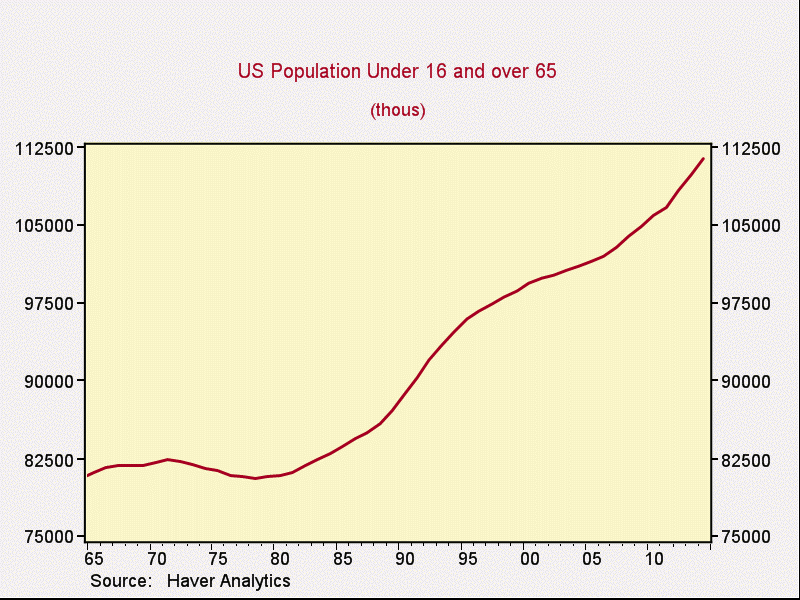A mere 3 day weekend will not prevent our morning reads from their daily route:
• 4 percent unemployment might be the new 5 percent unemployment (WaPo) but see The New Jobs Numbers Are Weaker Than They Look (NYT)
• 9 myths about the Greek crisis (Politico)
• A Venture Capital Giant Says: Bubble? What Bubble? (Dealbook)
• Things That Matter (Certifiable Planner)
• Bitcoin Is Unsustainable (Vice/Motherboard)
• A Comprehensive List of Everyone Trying to Sever Ties With Donald Trump (Gawker)
• Another Opportunity to Test Who is Right About the Economy (Washington Monthly)
• Airbnb and the Internet Revolution (Stratechery)
• One mind-blowing chart shows why the Supreme Court took on gerrymandering (WonkBlog) see also Majorities back Court rulings on marriage, ACA (CNN)
• You Might Never Love Exercise (But Do it Anyway) (Lifehacker)
Be sure to check out our Masters in Business interview this weekend with Omega Advisor’s Leon Cooperman.
Why Labor Participation Rate is Off: Population of Under 16 and Over 65 = 111.5 million (record highs)

Source: Brian Wesbury


The joy of public-private partnerships (P3) as the solution to infrastructure woes:
https://www.washingtonpost.com/local/trafficandcommuting/va-spends-260-million-on-unbuilt-road-but-says-it-could-have-been-worse/2015/07/02/638d9b62-20d2-11e5-aeb9-a411a84c9d55_story.html?tid=hybrid_collaborative_3_na
The Ten Weirdest Car Safety Features That Never Caught On
Aaron Brown
6/24/15
Automakers are constantly pushing forward with different new safety technologies that are supposed to save our lives. Sometimes, they don’t catch on.
http://jalopnik.com/the-ten-weirdest-safety-features-that-never-caught-on-1713504103
The rocket brakes technology actually did catch on. The original idea, as I heard it in the 1970s, was to use a solid fuel rocket to stop the car in a few tens of milliseconds. This saved the car, but wasn’t easy on the passengers. As solid rocket fuel technology advanced, they realized that they could aim little rocket engines at the passengers and use them to fill safety bags in mere tens of milliseconds and so air bags as we know them today were born. I always feel safer on the road knowing I have a few rocket engines pointed right at me, primed to ignite if the car hits something.
Can the Bacteria in Your Gut Explain Your Mood?
The rich array of microbiota in our intestines can tell us more than you might think.
By PETER ANDREY SMITH
JUNE 23, 2015
Eighteen vials were rocking back and forth on a squeaky mechanical device the shape of a butcher scale, and Mark Lyte was beside himself with excitement. ‘‘We actually got some fresh yesterday — freshly frozen,’’ Lyte said to a lab technician. Each vial contained a tiny nugget of monkey feces that were collected at the Harlow primate lab near Madison, Wis., the day before and shipped to Lyte’s lab on the Texas Tech University Health Sciences Center campus in Abilene, Tex.
Lyte’s interest was not in the feces per se but in the hidden form of life they harbor. The digestive tube of a monkey, like that of all vertebrates, contains vast quantities of what biologists call gut microbiota. The genetic material of these trillions of microbes, as well as others living elsewhere in and on the body, is collectively known as the microbiome. Taken together, these bacteria can weigh as much as six pounds, and they make up a sort of organ whose functions have only begun to reveal themselves to science. Lyte has spent his career trying to prove that gut microbes communicate with the nervous system using some of the same neurochemicals that relay messages in the brain.
…
http://www.nytimes.com/2015/06/28/magazine/can-the-bacteria-in-your-gut-explain-your-mood.html
Score one for Team Douchebag:
Washington reports first U.S. measles death in 12 years
http://www.cnn.com/2015/07/02/health/us-measles-death/
Why birth control pill dispensers look the way they do
http://throb.gizmodo.com/why-birth-control-dispensers-look-the-way-they-do-1715153534
Apparently Calpers is struggling to understand how much fees they are paying the private equity firms. Sounds like an ideal type of investment to put in an ETF to sell to Mom and Pop.
http://www.nakedcapitalism.com/2015/07/sacramento-bee-reports-on-calpers-fee-lapses.html